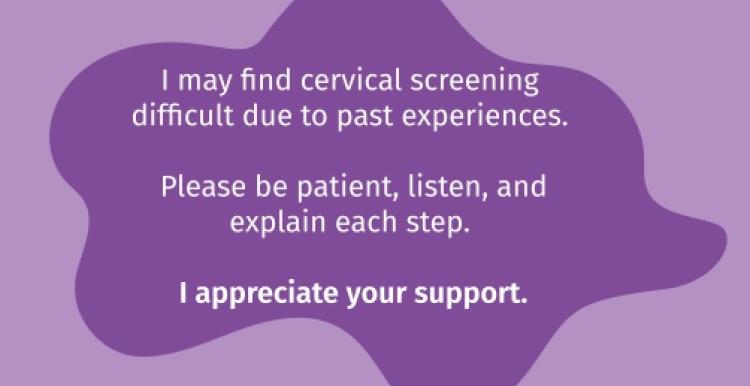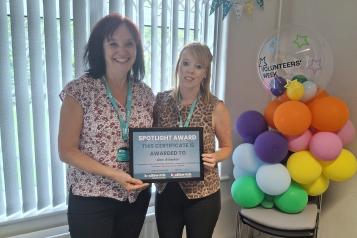Healthwatch Middlesbrough – Cervical Screening for Survivors of Sexual Violence and Abuse

The project came from hearing from one of Community Champions who work with survivors of sexual violence and abuse disclosing the impact and experiences of attending gynaecological health appointments, including cervical screening.
On further exploration there was no set or trauma informed way, locally, for survivors to access screening appointments without having to disclose past experiences and trauma. There seemed to be an ownership on survivors to disclose in order to get the best and right support. This can be difficult for survivors who may have not disclosed their past abuse or trauma to anyone before and feeling that they ‘have’ to do this.
Directed by the information and experience of our Community Champion we started to look at what could be done and ways to help improve access for survivors of trauma.
As a result of this, a steering group was made which brought together Healthwatch Middlesbrough, the local Public Health (South Tees) team, NHS North East Cancer Alliance and a local female GP who leads on an IRIS project and social prescribing. Further invites were also sent to representatives from LGBTQ and BAME communities to look at reaching even more people who may have additional barriers to accessing cervical screening appointments.
It was recognised that there is nothing locally to help survivors of abuse access cervical screening, and despite multiple initiatives and screening surveys launched, there was no specific thought to survivors. This was evident in conversations with healthcare professionals and with Rape Crisis Centres across the country. There is some guidance to help survivors of sexual violence from Rape Crisis, Jo’s Cervical Cancer Trust.
We met bi- monthly to look at current resources, ideas, information and what we could do. South Tees Public Health were also looking at ways to improve cervical screening and so we considered how to work together.
A survey was developed to understand survivors of trauma journey and barriers to accessing cervical screening appointments. This included gathering information from when people receive their letter, to understanding what might impact attending appointments and what could have been done differently.
We found that from the 46 responses:
- 60% had experienced some form of trauma, with most identifying that this impacted their attendance at cervical screening.
- Whilst most respondents attended their last smear, they also felt this was due to messaging and fear.
- 65% felt anxious, sick, nervous & dread when receiving letter.
Barriers:
- Healthcare professional attitude - 49%
- Appointments – 16%
- Painful – 10%
- Spectrum - 7%
- 35% felt that if the healthcare professional had been aware of past trauma, it would be useful.
- 50% liked the idea of an information card.
A Focus Group was held with survivors to look at ideas, designs and what that might look like.
Other recommendations included:
- Envelopes/Letters
- Room set up, ‘real’ videos and diagrams, explanations
- Checking in with survivors throughout screening
- Fidgets, sensory ideas, blankets, smells, materials (lack of awareness for people who are neurodiverse or have a disability)
Launch of the Cards
As part of Cervical Screening Awareness Week June 19th- 25th(2025) South Tees Public Health, Healthwatch Middlesbrough, and the NE Cancer Alliance will be launching their new Cervical Screening Campaign. As part of this the cards will be distributed across the area and available on websites.
We do a podcast with community champions regularly and have recorded one with members from the steering group highlighting the project, where it started, the journey to having the actual cards, as well as having some insightful conversations from the GP on how screening can be adapted for people to make them as comfortable and calm as possible.
There is also digital versions available, so people can have them on their phones or downloaded. Cards will be available at various Roadshows, healthcare professionals will be informed, and the information will be shared across South Tees.
Other local areas have already expressed an interest in promoting the cards and having their own printed copies
